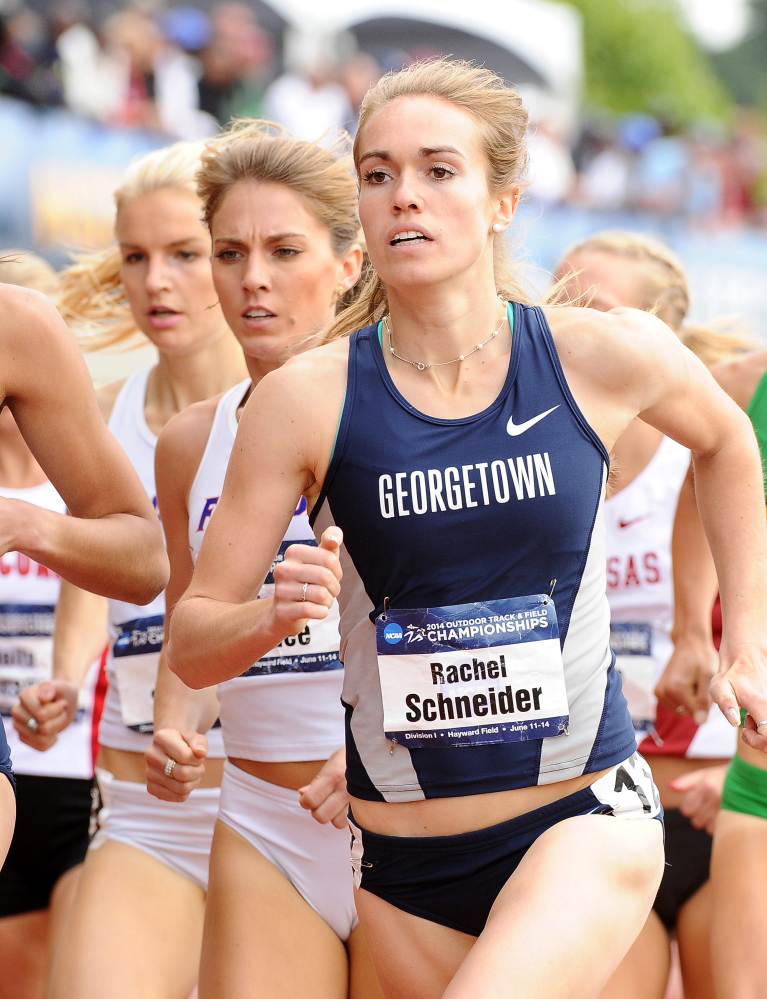Rachel Schneider says the end of her All-American collegiate career is “just the beginning” of her life as a competitive runner.
Competing for Georgetown University, the Sanford native finished ninth in the 1,500 meters at the NCAA Division I track and field championships earlier this month. She led most of the race in Eugene, Oregon, before falling prey to a late surge by a pack that had benefited from a slow pace. Still, she earned her eighth All-America honor – including cross country and indoor track – with her best finish in four trips to the NCAA outdoor championships.
For some, historic Hayward Field – arguably American track and field’s most revered venue – would have been a fitting place to hang up the spikes.
Not Schneider.
“Actually, I’m really excited to make running more of a focus and more of a purpose in my lifestyle,” Schneider said last week. “I love it. I just love it. I can’t imagine not doing it. It’s so fun to compete at this level and to have other people to push you to improve.”
Schneider, who’s visiting her older sister Kathy in California, plans to return to the Washington, D.C., area to begin working out a long-term training schedule with Georgetown distance coach Mike Smith while finishing her master’s degree in sports industry management.
“I definitely want to make the Olympic trials in the summer of 2016. That’s kind of what we’re setting the target for,” she said.
Schneider has proven she has the goods to make the trials’ “A” standard. Her personal-best time of 4 minutes, 10.53 seconds is well under the qualifying mark of 4:13 for this year’s U.S. championships. She said runners have made world championship teams running 4:09s.
“But you have to run it in the year leading up to the trials, so I will have to do it again,” she said.
Her father, Steve, said he’s not quite sure why the youngest of his four children became such a strong athlete. All were raised in Sanford, then attended St. Thomas Aquinas, a Catholic high school in Dover, N.H.
“They all played sports, but none had the success of Rachel,” he said.
He believes the relatively low-key track programs at St. Thomas and Georgetown helped maintain his daughter’s enthusiasm for running without overtraining.
Or maybe, Steve Schneider joked, “it’s because Rachel was the youngest and was always running away from the older ones after saying something to make them upset.”
Now Schneider makes an active effort to approach her elders and seek advice and counsel.
Schneider said she’s fortunate to have established relationships with several top women’s distance runners, including Lynn Jennings, a three-time Olympian and a 10,000-meter bronze medalist in 1992, and Julie Culley, a 5,000-meter finalist in the 2012 Olympics.
She first met Jennings while at St. Thomas, where as a senior in 2009 Schneider won the New Hampshire Class I 400 and 1,600 meters and the Meet of Champions’ 1,600, setting a Class I record in the 1,600 of 4:55.72 that stood until this spring.
Last summer, Schneider worked as a counselor at a running camp under Jennings’ direction.
“Lynn is just one of the most decorated female American runners of all time – three-time Olympian, three-time world cross country champion – and she’s really paved the way for female runners and is such a role model for me,” Schneider said. “It’s been cool getting to know her.”
Culley first met Schneider when they were in the same 1,500-meter race at a small meet in Pennsylvania in 2013. Schneider was red-shirting that spring so she would be able to compete in both cross country and outdoor track in her fifth year.
“Rachel is just a super friendly, outgoing person, and it’s kind of hard to be in the same race with her and not get a feel for who she is,” said Culley, who joined the Georgetown coaching staff as a volunteer assistant in January.
She describes Schneider as “a doer and a dreamer,” and said Schneider has the physical talent and enthusiasm to take her running to the next level.
“The only thing that will stand in the way of her achieving her goals is if she gets distracted with doing something else,” Culley said. “She’s definitely extraordinarily talented.”
Culley used her own career to illustrate that Schneider’s ninth-place finish at the NCAAs is not an accurate predictor of her future potential. A good collegiate runner at Rutgers, Culley never qualified for the NCAA championships, but she made the U.S. Olympic team after turning 30.
“Most of the time in middle to longer distances, girls aren’t peaking until their late 20s to mid 30s,” Culley said, adding it takes a willingness to commit for the long haul.
That’s a lesson Schneider says she’s taken from her mentors.
“Almost every single one of those athletes has talked to me about how the transition from collegiate to professional running is not always smooth and there can be a lot of obstacles,” Schneider said. “But they’ve also said if it’s something you really love and you have the support group, to stick with it. They say it’s worth it.”
Send questions/comments to the editors.



